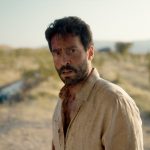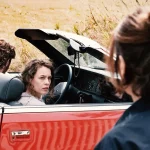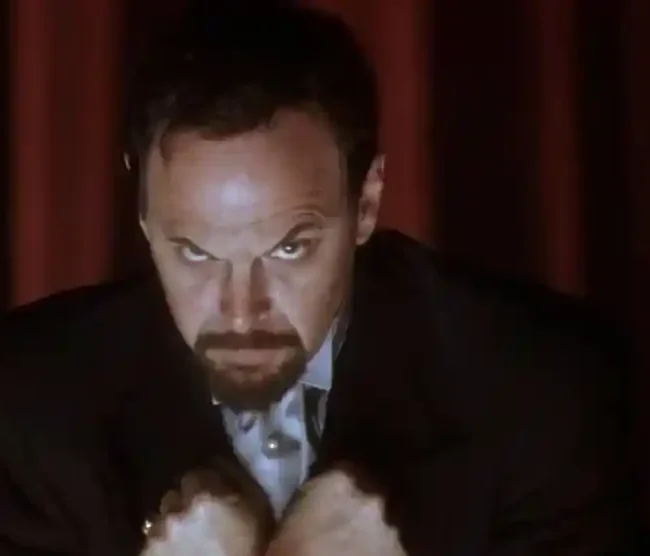A Conversation with Richard Linklater (BLUE MOON)
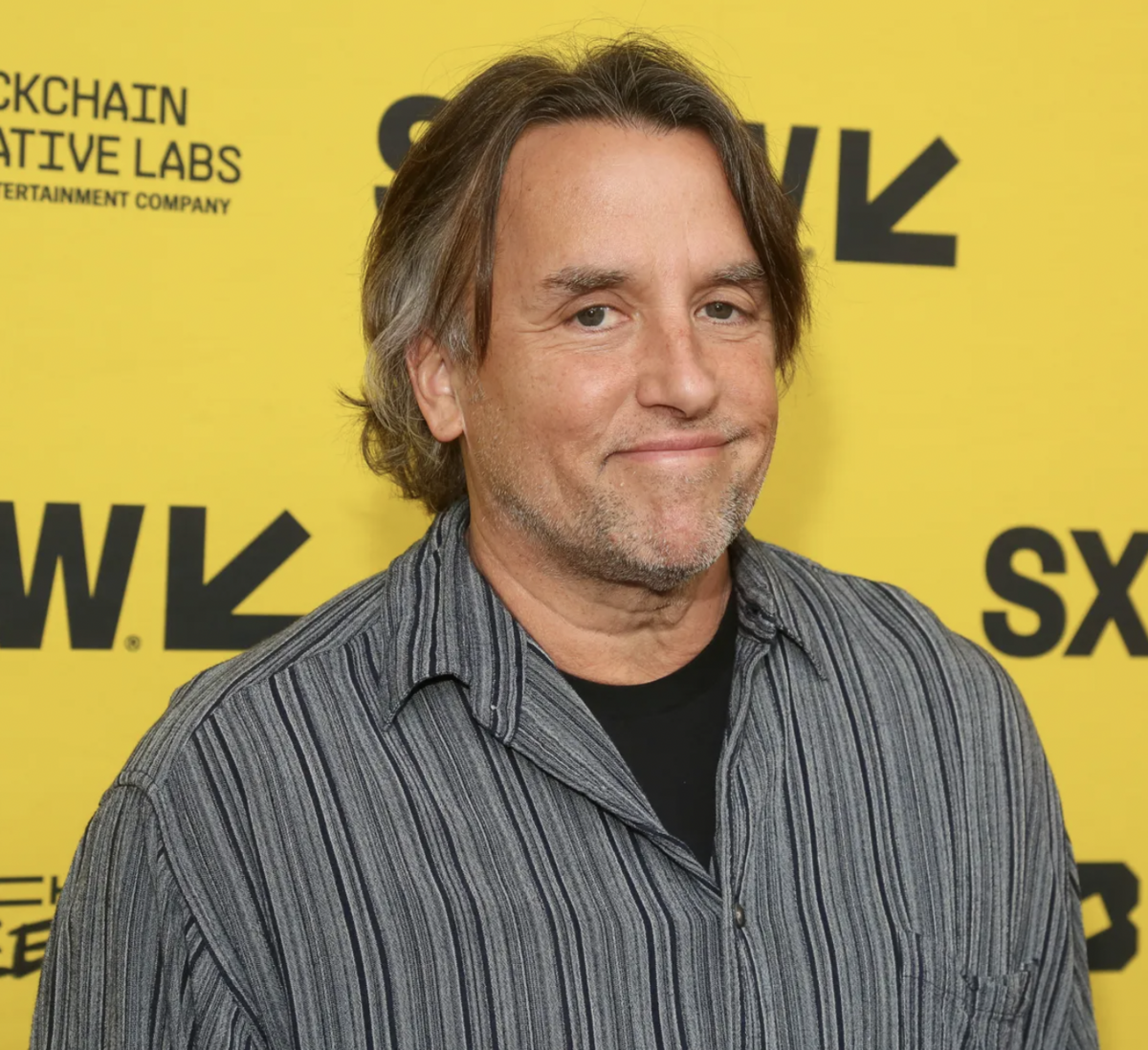
On the evening of March 31, 1943, the genre-revising Rodgers & Hammerstein musical Oklahoma! opened at the St James Theater in Manhattan. Before the boisterous curtain calls, Lorenz Hart left the theater for Sardi’s, just a few doors away. For the next 90 minutes of Richard Linklater’s new film, Blue Moon, the famous lyricist wittily and (initially) soberly reflects on his life and the apparent end of the Rodgers & Hart creative partnership which produced over 1000 songs in a 20-year success story. With a stellar cast featuring Ethan Hawke as Lorenz “Larry” Hart, Linklater explores this final turning point in the verbal artist’s life.
Hammer to Nail: In 2008, you completed Me and Orson Welles, based on the novel by Robert Kaplow. Then about five years later, you had Kaplow’s script for Blue Moon in your hands. Tell us how that came about.
Richard Linklater: Well, it wasn’t called Blue Moon certainly. The great thing about working with someone and striking up an artistic bond is you keep up – “What are you working on?” Robert’s one of these English teachers that changes young people’s lives. He’s taught senior English at a pretty nice high school in Summit, New Jersey. He’s written a lot of novels and plays. He has a thing for old timey radio. He did a lot of stuff for NPR, usually humorous bits, fun stuff. But he’s a witty, funny guy who, like me, kind of lives in the past. He loves different eras of culture. And he just feels like an old soul in the entertainment business.
So, we bonded on Me and Orson Welles that was set in 1937. I really love the music from that era. So, he told me, “I’m writing a thing about Lorenz Hart,” and I’m like, ‘Really? I’m a big Hart fan.” I knew the contours of his life. And certainly the two parts to [Richard] Rodger’s life – the Hart part and then the Hammerstein part. Larry dies fairly young at 48 in 1943. So, I knew of the general sadness of his life and everything.
Robert sends me what he’s written. At that point, he’s not even sure what it is. It’s practically a one-man show, but it’s not a play. It’s just dialogue and things. But everything that you might like about Blue Moon, I feel is in that original thing I read. The gist of it. I always called the whole piece this kind of sad howl into the night from an artist who’s being left behind, both by the culture and technically physically by his partner. It’s sad. It’s a breakup movie, but it’s also a breakup of times, old and new. It’s an artist aware of his own gradual, or in this case, kind of quick extinction.
So, Robert kept working on it. I felt it was the classic director-writer relationship you hear about. Whenever we all found ourselves in New York, we might do a reading of it and invite some actors. We were slowly building up to it. I felt the script just kind of got better and better.
It changed a lot, but Robert was such a great collaborator. I think he really trusted me and Ethan too, that we were on the right track.
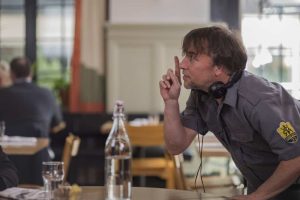
Linklater on the set of HIT MAN in 2023
HtN: Aside from an opening and closing scene of Hart walking in a rainstorm seven months later, you have two settings in the film: the St James Theater on W. 44th Street and just a few doors away Sardi’s restaurant, mainly the bar area. Yet, you filmed in a theater and film studio in Dublin, Ireland, just as you had filmed the Manhattan-based Me and Orson Welles on the Isle of Man. Talk about the experience of filming Blue Moon in Ireland.
RL: All films are just these constructs. You go into the Sardi’s of today, it looks a lot like our set. There’s been little things moved around over the years, but you would recognize our set. But first off, they’re not gonna shut down business for four weeks. They can’t afford that. So you gotta build it somewhere. And once you’re doing that, it can be anywhere. It’s expensive to build and film in New York. We were on a really micro budget.
So, we needed all the help we could get. And there was an Irish company that liked this project and they put in support. Outside of Dublin, they had these sound stages, and they have a good tax incentive. You’re always chasing the best deal and it’s kind of off the table once you’re not going to be using the actual location and the actual city. I don’t know if it would have been any more “New York” had we built it on a soundstage in Queens.
We go over there, and it was kind of fun to be in Ireland. They had a great crew. Everybody’s very passionate.
HtN: I love the fact that James Joyce, Oscar Wilde, and so many literary artists come from Dublin.
RL: Yeah, a tradition. It was amazing to be within that area going to the Joyce museums and Joyce walking tours.
HtN: You worked with Susie Cullen as production designer. She’s part of the Irish film industry. How did she go about designing the Sardi’s set?
RL: We were sort of blessed with the Irish A-team. Susie’s a topflight production designer. And we had that really in every department. But we had limited time. So, over Zoom, she’s in Dublin, and I’m here [in Austin], or I was even in France for a little bit. We know our stage. You get the original drawings from Sardi’s – the architectural elements, all the measurements, and all the details. Everybody’s doing research. Mike Blizzard, one of our intrepid producers, was calling up Sardi’s asking [for information]. You read the histories.
HtN: Sardi’s is famous for the hundreds of framed actor caricatures on the walls throughout the restaurant. Did you try to replicate the exact ones that would have been on the walls that night?
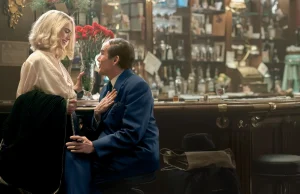
RL: No, they moved them around all the time. No one will be able to say, “Oh, that picture wasn’t there on that night because….” There’s no record. And they were always in flux. So, you give yourself permission because you’re trying to get those details right, the best you can. It’s important.
We drew our own caricatures. If you look closely, we had The Wizard of Oz on the wall, we had Margaret Hamilton, Burt Lahr, and Ray Bolger. We added one fictional character, too. Can you guess who?
HtN: [I failed, but even though I now know, I won’t divulge the answer here]. Ethan Hawke was very excited about playing Lorenz Hart, but you purposely waited over a decade before filming. Discuss your reasons for putting off production until recently.
RL: I was in New York and had [an early version of the script] with me. I was meeting with Robert and Ethan read it and got really excited. At that point, I was like, “Ethan, you’re not Lorenz Hart. You’re taller.” But the way he started talking about it, I said, “Well, anyone can be anyone.” But that was well over 10 years ago. So, it became just this kind of floating project for us that we talked about a lot.
HtN: It’s amazing that you shot the film in just 15 days. Ethan’s performance is awe-inspiring. He perfectly embodies Lorenz Hart’s wit, intelligence, verbal gymnastics, and wide-ranging emotions. This is your ninth feature film with Ethan, so your working relationship must be very comfortable in many ways.
RL: As Ethan’s friend, I knew this was such a heavy lift, like we were really breaking down Ethan’s life. And he says he’s never really been asked to transform to this degree, not just physically the five feet tall and the hair but just himself. Even two years ago we’re reading and I said, “Ethan, I still see Ethan here a little bit now. You know the way you say, ‘Fuck, yeah!’ and you do that gesture. That’s a really masculine, Ethan Hawke, hetero gesture. I don’t see Larry Hart being that.” Every element of Ethan’s being had to kind of slowly dial down. And so a lot of my directing was kind of nagging about these little details. Ethan wanted to put more on it, and I was like, “Just let the words do it. Larry’s a word guy. He sits in words. He’s not a showman. Just let the words carry the joke. You don’t have to make a fake accent and do something else, and you don’t have to put a lot of stuff on it. This isn’t boring. We let the words and your character carry it. We’re gonna care about you, unless you’re so annoying that we can’t. We’re trying to make you lovable even though you’re irritating.”
HtN: That’s where the director really is of infinite importance even when working with the finest of actors. You’re like a conductor of a symphony, quieting it down, bringing it up.
RL: It’s also getting it to blend. He has to have a thing going with everybody. He’s got his relation with Eddie the bartender, with the new pianist, and then of course, the long-term relationship with Rodgers, that’s so complex, so deep. So, if Ethan does it right, they all have their moment, like he’s the center of it, but they’ve got to be great or the whole thing falls apart. They can’t just be adjuncts to him. It was a wonderful cast who worked really hard. It was a big one with so much rehearsal required and so much thought.
HtN: The physical transformation of Ethan Hawke into Lorenz Hart is phenomenal. Hawke is in his mid-50s, still very good-looking with a full head of hair, and nearly six feet tall. Hart was barely 5 feet tall, and that is how short Ethan looks in the film in comparison to the other actors. Besides the head-shaving and comb-over, explain how Hawke’s appearance was achieved for the film with the assistance of Latham Gaines, the “height wizard.”
RL: All I can say is “old school stagecraft.” We used no visual effects whatsoever. Latham, who is kind of an engineering genius, put his own inventor-designer-engineer brain to it. Ethan had worked with him in theater. I’d known him a while. He’s the guy who builds musical instruments and toys and is just a fascinating guy. He was like, “Okay. Here’s your problem. Here’s what you need. Here’s how we get it. In general, instead of raising up the world, making other people taller, we just got to lower Larry.”

Ethan Hawke in BLUE MOON
So, it was done through stagecraft. Visual trickery. You do a shot where you show him standing at full height and he’s short, and then you can go awhile and not see him full body. He’ll be sitting so much and then, when he moves, he’s lower. But that height thing was so important for Ethan – once he was “actually” five feet tall looking up at everybody.
And then with his head shaved and with his combover, when [Ethan’s] own wife Ryan showed up and just went the other direction, I said, “OK, Ethan. Welcome to Larry’s world. Nobody wants to sleep with you. I know that’s a foreign thing for you in your life so far, but you have to think about that.”
HtN: The only other narrative film that I know of which focused on Rodgers and Hart was the 1948 Technicolor MGM musical Words and Music, starring the obvious choice at the time, Mickey Rooney. The studio didn’t even have to hire a “height wizard.” Produced at a time of the strict Hayes Production Code of Do’s and Don’ts, the film completely erased any suggestion of Hart’s homosexuality and alcoholism and simply made him a creative, but lovelorn straight man who disappeared a lot. In contrast, Blue Moon clearly shows Hart’s losing battle with alcohol and contains numerous references to his dominant sexual orientation. Yet now, since he feels he is on the verge of losing his longtime professional relationship with Richard Rodgers and since he has apparently never had a long-term romantic relationship, he is desperately hoping to somehow miraculously forge a loving bond with a young woman. How did you and Ethan find ways to create such a complex dynamic within the character of one man?
RL: Larry did not have what anyone would call a traditional romantic relationship. I mean, he longed for that. He was in the best of times for his songwriting gift. To catch that wave of Broadway and to flourish the way he did, to get paid to write a thousand songs. To have all those shows and to have partners like Richard Rodgers. His timing was Bingo! And yet for himself to be a gay man at that time, just your sexuality is illegal along with the social thing. He would disappear for days at a time. He was probably into the gay underground. He’s trying to avoid scandal, I’m sure. But there’s people who knew him who weren’t really sure of his sexuality. You had to get to know him pretty well. Again, that’s sad, too, that he’s presenting, if not straight, not gay.
The main person in his life was his mom and then Richard Rodgers. Another huge turning point in his life, which I think led to his early demise, was his mother died shortly after what we show in this movie. He was never sober another day for the next six months till he died. So that was as big a thing as probably the Rodgers [separation].
They did [a revival of] Connecticut Yankee. He did some new songs, right, but it truly was like Rodgers could not have ever worked [with him again]. Those five new songs were just hell.
You watch interviews with Rodgers from the 70s. He’s near the end of his life. They mention Larry and he just bristles. He’s like, “Larry almost killed me.” He’ll talk so beautifully about him – “You know Larry was a direct descendant of Heinrich Heine, the German poet.” He can speak so eloquently about how quick Larry was and what his gifts were, but then when you get into the working with him, the personal, …. Having worked with alcoholics, we, everyone can relate. It’s like, “Oh, the gifted man who’s making themselves impossible because of their problems.” So, it’s a gut-wrenching situation. But you could see it on Rodger’s face and Andrew pulls this off marvelously.
HtN: Andrew Scott’s portrayal of Richard Rodgers is brilliant. You can see his face go from distrust, to disgust, to sympathy while he’s talking to Larry. It was just astounding watching that.
RL: Yeah, the mixed emotions of that. I had him watch all those Rodgers interviews and really that guy is just an amazing actor. I saw him do, recently, Uncle Vanya in New York. He plays every part. He’ll turn and his accent will change and he’ll be in a new position. I’m watching it going, “God, I don’t know how many actors on the planet could be doing this.” So, he was a real joy to work with.
HtN: And Margaret Qualley’s Elizabeth Weiland is a long way from Pussycat in Tarantino’s version of the Charles Manson family or Demi Moore’s younger “emergent” in The Substance.
RL: She’s wonderful. Marvelous Margaret Qualley. Actually, ten years ago I auditioned her for Everybody Wants Some!!. It’s so funny how life circles back. It was between Zoey Deutch who plays Jean Seberg in Nouvelle Vague and Margaret Qualley. Those were the final two for Beverly, the young woman in Everybody Wants Some!!, and I loved them both, but I told Margaret, “You are just too stunningly beautiful.” [She]: “That’s such bullshit.” I said, “No, it’s really true. What would you be doing at this state school fucking around with these college guys? You are so like supermodel good-looking.”
I’ve been seeing everything Margaret’s been in over the years, and she’s just exquisite. She worked so hard, she came in, was fully dedicated, and she really got Elizabeth, and she got that relationship [with Lorenz], too. What is that affection between two people? It’s not even sexual. It’s his mind, it’s his spirit, it’s his humor, and he can help her.
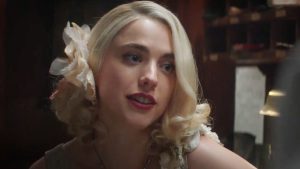
Margaret Qualley in BLUE MOON
This is the kind of thing you talk about a lot in rehearsals. What does Larry want? He wants to be loved and to love. And he probably sees them as buddies. Wouldn’t it be great to come home to this beauty every night? “And maybe we both have our sex lives. You tell me about the guy you’re sleeping with, and I’ll tell you about the guy I’m sleeping with, but then we’ll come back where it’s just us and everything’s great.”
Didn’t Cole Porter kind of have that? It wasn’t completely uncommon, I think, that home is affection, respect, but it’s not sex. You go elsewhere for that.
Relationships are not any one thing. They’re very complex. And I think some people are like, “Well, Lorenz Hart was gay. What is this stuff about a woman?” Well, there were actual letters. He had this pen pal relationship with this woman who was at Yale. It was her talking mostly about herself in these letters that Robert [Kaplow] read.
Robert had that ability, which is I think a great writer’s brain working. In the same way, he saw a photo of Orson Welles doing his famous Julius Caesar, but there’s this little kid with a ukulele, and Robert looks at that and goes, “What was that like for that kid to be here this moment in history with a young Welles?” That’s exciting. What an interesting way to see him from the viewpoint of a very expendable minor player in a big famous Orson Welles production.
So, that was Robert. Like, what’s going on with this young woman? What an interesting character to introduce to this mix and have that be such a motivator for Larry on top of what’s going on in his life on this night. It’s just that layer of complexity and the depth of the theme – “No one loved me that much.”
HtN: You’d worked with Bobby Cannavale before in Fast Food Nation. You probably didn’t have to give him any guidance whatsoever for his part as an Italian American bartender.
RL: Yeah, and I’ve seen him in a lot of theater and other things too. Bobby’s just a great guy. I’ve been itching to work with him again any way I can. Like so many actors, I was just happy to have a part I could even offer him. And then Ethan and he are buds, too. Years ago, we were like, “Wouldn’t that be awesome if Cannavale played the bartender? That would make it so New York, so real, like the humor and such a contrast to everybody else.” Bobby is a sweet artist guy, but he can immediately play the Italian asshole mafioso. He knows that guy, but he’s not that guy. So he could be that kind of lunkhead.
HtN: And the beauty of it is that he’s sympathetic to Lorenz at the same time.
RL: He has an affection for Larry. Like any good bartender, they’re part psychologist. He knows what Larry’s going through. Larry’s plight for tonight. He’s just hoping that he gets out alive. And he kind of wants to throw in the towel too, like, “OK, Larry’s too far gone. I might as well just start serving him drinks.”
HtN: And then Jonah Lees, who plays, ‘Knuckles,’ the young piano player at Sardi’s. I haven’t seen him as John Lennon in Midas Man, but I can see that he’s very sweet looking, young, and all. I think that in a different situation Lorenz Hart might have hit on him the way he does with the flower delivery kid.
RL: Yeah and it’s almost implied in the bathroom when they’re together, but Lorenz is talking about asking a woman to marry him. There’s no stories of him being a letch or anything inappropriate. I think that’s the fine line. It was all verbal, witty and implied.
That’s a fun character, little soldier boy off to war, even though he’s not going to the front. But yeah, it’s easy to forget on this night that we’re a country at war.
Jonah was wonderful. That’s the kind of part you’re just open to anyone. You audition a lot of people and he seemed to have the right mix of musical ability. He could play the piano, he could learn those numbers, but he wasn’t like a professional pianist. He plays other instruments and comes from a musical family, but he could do just well enough to be believable. But in the soundtrack, it’s Graham Reynolds playing the piano.
In those additional parts, the guy playing E. B. White, Patrick Kennedy, was actually in Me and Orson Welles. That’s an actor I liked working with back then. It’s great when life kind of comes around. He had this kind of confidence about himself, but he was a quiet guy too and I was like, “Let’s look at Patrick for this and he was just great.”
HtN: I love the suggestion that he gets the idea for Stuart Little from Lorenz and his mouse story.
RL: That is Robert’s conceit that Larry is the best barfly buddy you could ever have. He’s actually there to help you, he’s giving you ideas. He’s seeding the ground. Even when little 12-year-old Stevie Sondheim shows up, he throws out, “Weighty affairs will just have to wait.” That’s a future Sondheim lyric [from A Funny Thing Happened on the Way to the Forum] that little smartass Sondheim kind of dumps on.
The idea that Hart would be a positive in people’s lives like that is a little much, but the reason he was well liked was he did offer a lot.
HtN: Well, my stingy Zoom-time-allotment is about to run out, and we didn’t even get to discuss Sandra Adair’s excellent editing and the fine cinematography of Shane Kelly. I also wanted to discuss the clever film references in the dialogue and the snippets of 42 famous songs in the film, but I will just have to learn about all that from interviews you do with others. Thanks so much for talking with me today. I feel certain that Blue Moon will be getting Oscar nominations for Best Picture, Directing, Screenplay, Actor, and Supporting Roles.
– Chale Nafus (@chale_nafus)

